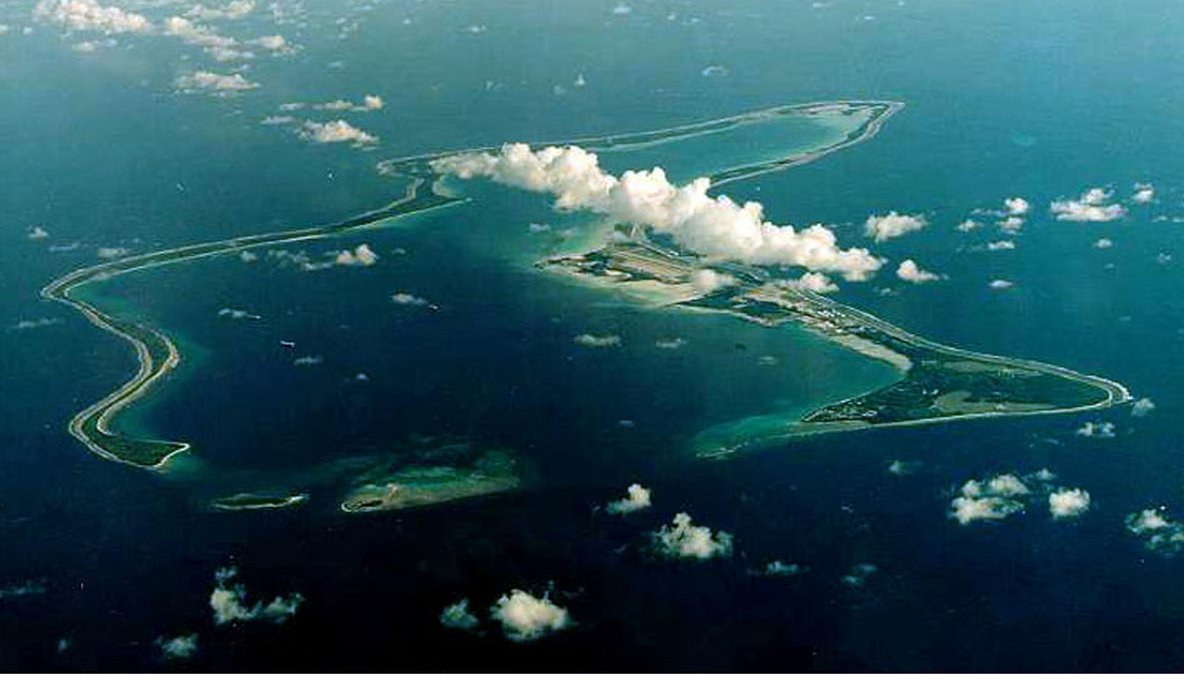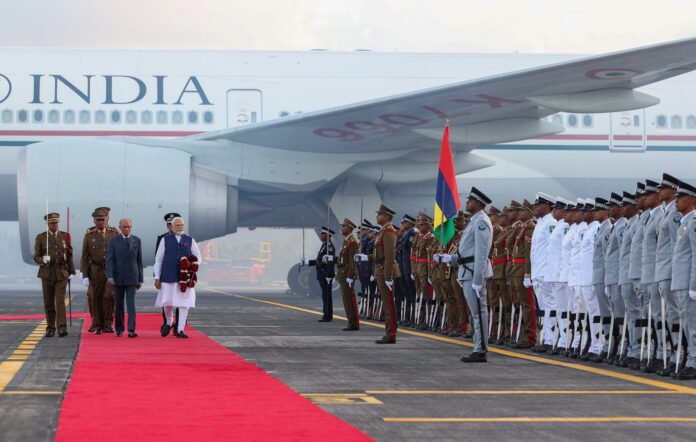Apparently, India has signed an agreement with the Mauritian government to secure its defence presence on the Chagos Islands. The report does not give a precise location for the new facility, which has probably not yet been fixed, but postulates it will be “near the Diego Garcia US-UK strategic base.” It is not clear how the site will be serviced. The Indian ambition is likely to be to create a similar facility to that it has already established on Agaléga, an island belonging to Mauritius, which, despite denials, India has already for practical purposes annexed.
Mauritius is heavily dependent on India’s support and goodwill, under which Mauritius operates as an offshore financial centre for India. When the agreement was signed, India’s Prime Minister Modi said he had always supported decolonisation of the Chagos, and that while “India and Mauritius are two nations, our dreams and destiny are one.”
Also, as part of the Indian-Mauritius agreement, which was made during an eight-day visit of Mauritius PM Navinchandra Ramgoolam to New Delhi in September 2025, a plan was sanctioned to allow Indian naval vessels to conduct hydrographic surveys of the archipelago, most of which was a closed describing it as a ‘Marine Protected Area’ when administered by the British Indian Ocean Territory. Such surveys would be necessary if India’s Arihant-class nuclear-powered ballistic missile submarines are to operate in Chagos waters.
The deal also calls for the refitting of a Mauritius Coast Guard ship to prepare it for patrol duties in the Chagos, and the provision of $680 million in aid, some of which is allocated to “development of the Chagos Marine Protected Area.”
Mauritius won a strategic victory on May 22, 2025, when the United Kingdom (UK) officially handed over sovereignty of the Chagos Islands after finalising the political treaty agreed to in October last year. Under the deal, the important naval and bomber base on Diego Garcia — one of the archipelago’s largest islands, operated by US forces, will be leased by the UK from Mauritius which will maintain sovereignty over the region
Importance of Mauritius Getting Chagos Islands
Mauritius won a strategic victory on May 22, 2025, when the United Kingdom (UK) officially handed over sovereignty of the Chagos Islands after finalising the political treaty agreed to in October last year. Under the deal, the important naval and bomber base on Diego Garcia — one of the archipelago’s largest islands, operated by US forces, will be leased by the UK from Mauritius which will maintain sovereignty over the region, according to The Independent.
Terming the deal as vital to British security, PM Starmer said that it was the only way to maintain the naval base’s long-term future. He added that if UK had not agreed to the deal, the legal challenges mounted by Mauritius would open avenues to China or any other nation to set-up their own bases on the outer islands or carry out joint exercises near its base. Mauritius has agreed to initially lease Diego Garcia to the UK for £101 million a year for 99 years.
India had welcomed the signing of the treaty between the United Kingdom and Mauritius on the return of Mauritian sovereignty over the Chagos Archipelago, including Diego Garcia. External Affairs Ministry said in a statement that the formal resolution of the longstanding Chagos dispute through this bilateral treaty is a milestone achievement and a positive development for the region. This is further to the understanding between the two sides reached in October last year, and marks the culmination of the process of decolonisation of Mauritius in the spirit of international law and rules-based order.
India has consistently supported Mauritius’s legitimate claim over the Chagos Archipelago in keeping with its principled position on decolonization, respect for sovereignty, and the territorial integrity of nations. External Affairs Ministry said in a statement that as a steadfast and longstanding partner of Mauritius, India remains committed to working closely with Mauritius and other like-minded countries to strengthen maritime security and regional stability and ensure peace and prosperity in the Indian Ocean region.

Diego Garcia
Whenever, the name Diego Garcia is mentioned, an image of a remote island probably in the Caribbeans or near Greece conjures up, but in reality, it lies much closer to India in the Indian Ocean. For years it has served as an important base for the US and UK air and naval forces.
Whenever, the name Diego Garcia is mentioned, an image of a remote island probably in the Caribbeans or near Greece conjures up, but in reality, it lies much closer to India in the Indian Ocean. For years it has served as an important base for the US and UK air and naval forces. According to a BBC report, the base is also one of an “extremely limited number of places worldwide available to reload submarines” with weapons like Tomahawk missiles, and the US has positioned a large amount of equipment and stores there for contingencies
According to a BBC report, the base is also one of an “extremely limited number of places worldwide available to reload submarines” with weapons like Tomahawk missiles, and the US has positioned a large amount of equipment and stores there for contingencies.
Walter Ladwig III, a senior lecturer in international relations at King’s College London, agrees the base fulfils “a lot of important roles” – but that “there is this level of secrecy that seems to go beyond what we see at other places”.
Rumours have long swirled about the uses of Diego Garcia, including that it has been used as a CIA black-site – a facility used to house and interrogate terror suspects.
The UK government confirmed in 2008 that rendition flights carrying terror suspects had landed on the island in 2002, following years of assurances that they had not, as per the BBC. Further, tankers operating from Diego Garcia refuelled US B-2 bombers that had flown from the US to carry out the first airstrikes on Afghanistan after the 9/11 attacks. And, during the subsequent “war on terror”, aircraft were also sent directly from the island itself to Afghanistan and Iraq.
What is British Indian Ocean Territory (BIOT)
The British Indian Ocean Territory (BIOT) is a unique feature of the British decolonisation process, whence it gave independence to some nations governed by it, but retained some parts of those nations which were strategically important to it. Diego Garcia and Chagos Islands are prime examples of this. Many critics also describe the British Overseas Territories (BOTS), as part of the British scheme from where dirty money was channelised back to the UK.
Chagos Islands are important for India due to their strategic location in the Indian Ocean and its support for Mauritius, India’s key partner in the region. India’s position is focused on strengthening regional maritime security and stability, especially in the context of countering China’s growing influence
Chagos Islands are important for India due to their strategic location in the Indian Ocean and its support for Mauritius, India’s key partner in the region. India’s position is focused on strengthening regional maritime security and stability, especially in the context of countering China’s growing influence.
Strategic importance for India
India sees the deal as strengthening its ties with Mauritius, a key regional partner. India remains committed to working with Mauritius to enhance maritime security and regional prosperity. The security of the Indian Ocean is a top priority for India, and the territory’s location is crucial for monitoring shipping lanes and projecting power.
The territory is at the heart of the Indian Ocean, and its control by a major power like the US, which is a factor in India’s broader strategy to counter China’s growing influence in the region. On the other hand, the agreement sets a precedent for other similar situations and reflects the UK’s evolving position as a global power, succumbing to the current geopolitical landscape yet trying to continue its control over some territories, where it could still implement the jungle law, as per its convenience and desire.
-The writer is a New Delhi-based senior commentator on international and strategic affairs, environmental issues, an interfaith practitioner, and a media consultant. The views expressed are personal and do not necessarily carry the views of Raksha Anirveda






